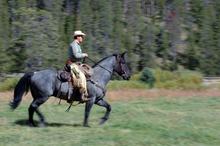Equine Land Conservation Resource (ELCR) works to keep land open for horses by providing the much needed tools, information, resources and technical assistance to individuals and organizations acting locally to save horse lands.

Keeping trails available for horses and equestrians
Resources available through ELCR focus around six core issue areas related to land loss and how it affects equestrian access to land and the environment for horses.
Resources available through ELCR focus around the following six core issue areas related to land loss: Planning for Horses in Your Community, Conservation Tools for Horse Lands, Equine Access to Public Lands, Equine Access to Private Lands, Balancing Ecology and the Bottom Line and Equine Economic Impact.
“In addition to launching a new website, I am pleased to announce that we have also refreshed the subject matter related to the six core issue areas,” says Anna Gibson, ELCR CEO. “The new website was built with the knowledge that the resources ELCR offers will continue to expand and evolve with the issues that threaten our horse lands.”
Visitors to the new site will find a wealth of information related to the six conservation core issue areas, in a very accessible user friendly format. All of ELCR’s online information, tools, templates and resources are now available for public access at no cost.
“We are excited about the enhancement of our web based resource library and user friendly format as well as the ability to now offer these unique and relevant materials free of charge to the general public”, says Denise O’Meara, ELCR Director of Education.
“These materials are part of the ELCR educational curriculum that includes regional forums, webinars and teleconference calls on various equine land loss issues.”
About the Equine Land Conservation Resource (ELCR): The Equine Land Conservation Resource is the only national not-for-profit organization advancing the conservation of land for horse-related activity.
ELCR serves as an information resource and clearinghouse for land and horse owners on issues related to equine land conservation, land use planning, land stewardship/best management practices, trails, liability and equine economic development.
